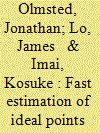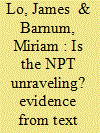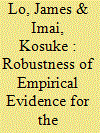|
|
|
Sort Order |
|
|
|
Items / Page
|
|
|
|
|
|
|
| Srl | Item |
| 1 |
ID:
149669


|
|
|
|
|
| Summary/Abstract |
Estimation of ideological positions among voters, legislators, and other actors is central to many subfields of political science. Recent applications include large data sets of various types including roll calls, surveys, and textual and social media data. To overcome the resulting computational challenges, we propose fast estimation methods for ideal points with massive data. We derive the expectation-maximization (EM) algorithms to estimate the standard ideal point model with binary, ordinal, and continuous outcome variables. We then extend this methodology to dynamic and hierarchical ideal point models by developing variational EM algorithms for approximate inference. We demonstrate the computational efficiency and scalability of our methodology through a variety of real and simulated data. In cases where a standard Markov chain Monte Carlo algorithm would require several days to compute ideal points, the proposed algorithm can produce essentially identical estimates within minutes. Open-source software is available for implementing the proposed methods.
|
|
|
|
|
|
|
|
|
|
|
|
|
|
|
|
| 2 |
ID:
176043


|
|
|
|
|
| Summary/Abstract |
The Treaty on the Non-Proliferation of Nuclear Weapons (NPT) is a landmark international treaty that is widely regarded as a cornerstone of the global nuclear non-proliferation regime. However, pessimists point to a growing divergence of preferences between nuclear weapons states and non-nuclear weapons states as a precursor to the impending ‘unraveling of this vital piece of international law’. In this article, we test for evidence of preference divergence using statements from NPT review conferences, which are manifestos presenting each country’s position on the NPT. We measure preferences on the NPT using Wordfish, a method that is frequently used to estimate ideological preferences from election manifestos. Our measure estimates the latent positions of state actors along a ‘non-proliferation vs. disarmament’ dimension, and shows little evidence of growing preference divergence between the nuclear weapons states and non-nuclear weapons states. Thus, a significant premise underlying more pessimistic assessments of the NPT appears to be in doubt.
|
|
|
|
|
|
|
|
|
|
|
|
|
|
|
|
| 3 |
ID:
179870


|
|
|
|
|
| Summary/Abstract |
The democratic peace—the idea that democracies rarely fight one another—has been called “the closest thing we have to an empirical law in the study of international relations.” Yet, some contend that this relationship is spurious and suggest alternative explanations. Unfortunately, in the absence of randomized experiments, we can never rule out the possible existence of such confounding biases. Rather than commonly used regression-based approaches, we apply a nonparametric sensitivity analysis. We show that overturning the negative association between democracy and conflict would require a confounder that is forty-seven times more prevalent in democratic dyads than in other dyads. To put this number in context, the relationship between democracy and peace is at least five times as robust as that between smoking and lung cancer. To explain away the democratic peace, therefore, scholars would have to find far more powerful confounders than those already identified in the literature.
|
|
|
|
|
|
|
|
|
|
|
|
|
|
|
|
|
|
|
|
|